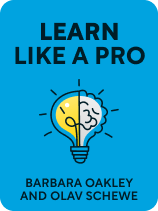

This article is an excerpt from the Shortform book guide to "Learn Like a Pro" by Barbara Oakley and Olav Schewe. Shortform has the world's best summaries and analyses of books you should be reading.
Like this article? Sign up for a free trial here.
Do you get tend to give up when a challenge is too difficult? Does anyone encourage you to learn and hold you accountable?
You’re probably well aware that motivation and self-discipline help when you want or need to learn something new. In Learn Like a Pro, Barbara Oakley and Olav Schewe contend that, the more motivation you have, the less self-discipline you need.
Keep reading for their advice on how to motivate yourself to learn.
Improve Learning by Boosting Motivation
Improving your motivation and self-discipline to tackle learning tasks can improve how effectively you learn. Motivation is how much effort you’re willing to put into achieving a goal, and self-discipline, or willpower, is your ability to make small sacrifices now to accomplish that goal in the future.
The authors argue that, when it comes to your self-discipline for learning, the best approach is not to cultivate more of it but instead to focus on strategies that reduce or eliminate your need to use it in the first place. Boosting your motivation is one of the best ways to bypass the need for self-discipline; when you’re motivated to learn, you don’t need to tap into your willpower to do it. The authors share five recommendations for how to motivate yourself to learn.
(Shortform note: Although the authors don’t focus on strategies to cultivate and strengthen self-discipline (but rather, to avoid the need to use it), many psychology experts offer techniques for increasing your willpower, including Kelly McGonigal in The Willpower Instinct. McGonigal explains that things like stress, guilt, and not getting enough sleep and exercise deplete your willpower, and by addressing these factors, you can restore your ability to delay gratification in pursuit of long-term goals.)
You may not always feel enthusiastic about your learning tasks, but the authors recommend several ways you can strengthen your motivation for learning and lessen the need to exert self-discipline to accomplish your learning goals.
#1: Set Compelling Goals
To stay motivated, set three types of goals: long-term goals (like starting your own business), which keep you focused on and excited about the future; stepping-stone goals (like getting your MBA), which are closer in time and help you reach your long-term goal; and process goals, which are short-term and actionable daily and weekly learning tasks (like studying for your MBA exams) that build toward your stepping-stone goal.
#2: Make Specific Study Plans
Make plans to study, and anticipate the obstacles that could deter you. Strategize when, where, and how you’ll study or practice and mark it on your calendar because you’re more likely to follow through on studying if you make a plan. Then, think about what could get in the way of your plan—for example, your friends inviting you to hang out on your study day. It’s also helpful to set yourself up for success. For example, if you know you always forget your glasses when studying at a coffee shop, set your book bag up with everything you need the night before.
| Goal-Setting and Deliberate Practice Develop Grit In Grit, Angela Duckworth says that setting different levels of goals, making study and practice plans, and planning for potential obstacles are all techniques for developing grit—what she defines as a combination of perseverance and passion. Duckworth explains that setting goals provides you with a clear sense of direction and purpose, which helps you stay motivated and focused over the long term. Planning and structuring your practice and study time, along with anticipating learning obstacles, would be considered a part of what Duckworth calls deliberate practice—a purposeful way of focusing your effort in order to achieve tangible outcomes—which helps you develop the grit you need to stay committed to your goals. |
#3: Change Your Habits
You might need to break old habits and make new ones. We all have habits and routines, and some may get in the way of our learning. For example, maybe you focus and learn better in the evening, but you’re in the habit of playing video games after dinner. Identify the habits that may make it harder for you to commit to your learning goals and try to change them.
(Shortform note: The authors don’t offer explicit advice for how to go about changing a habit or routine, but Charles Duhigg in The Power of Habit explores why we form habits and how to change them. Duhigg argues that having self-discipline is not enough on its own to change a habit—you must understand how habits work and address what reinforces them. Habits become automatic through a cycle of cue, routine, and reward and are reinforced by our cravings. The anticipation of a reward is often more pleasurable than actually experiencing it, driving you to continue your habitual routines. To break unwanted habits, it’s important to make cues less visible, routines more challenging, and rewards less satisfying.)
#4: Don’t Isolate Yourself
Spend time with people interested in and passionate about what you’re learning. Learning with others makes it more enjoyable and fulfilling, which are powerful emotional motivators. Involving others in your learning also helps keep you accountable for your goals—it’s harder to procrastinate, forget, or avoid learning tasks if you have made a commitment to another person.
(Shortform note: While spending time with others who share your interests can be a great way to enhance your learning experience, there are potential drawbacks. For example, education experts warn that group learning can sometimes be distracting or unproductive, with conversations or discussions that are not directly relevant to the task at hand. Ultimately, it’s important to balance the benefits and downsides of group learning to ensure that your learning goals and needs are always front and center.)
#5: Match Difficulty With Skill
Match the difficulty level of a task with your skill level. Tasks that are too challenging will discourage you, and ones that are too easy will bore you. The feeling of mastering something—when your skill level matches the difficulty level of a task—is highly motivating. If a task is just beyond your level, don’t be shy to ask for help. The authors also recommend breaking up learning tasks into manageable chunks to allow yourself more time to absorb the information.
(Shortform note: Matching your skill level with the difficulty level of a task not only improves your motivation—Chris Bailey adds that it will also boost your ability to focus. This is because when you are bored or stressed by a learning task, your mind will naturally wander. Improving your motivation and focus together make matching skill level with task level a powerful learning tool.)
Exercise: Boost Your Motivation to Learn
Boosting your motivation for learning (which reduces the need to force yourself to complete essential learning tasks, like studying) is an important part of improving your learning process. The following exercise will help you apply the author’s learning motivation and willpower tips to your own life.
- Think about a learning goal you want to achieve. What obstacles could deter you from achieving that goal? Are they external obstacles (like your work schedule) or personal habits and routines? Make a short list of them.
- From the list you made of obstacles, reflect on which you have some control over and plan how to overcome those obstacles.
- Finally, reflect on how isolated you are in your learning process. Do you study alone or with others? If you study alone, make one commitment in the next month to study or practice with others. If you study with others, how might you make that time even more productive?

———End of Preview———
Like what you just read? Read the rest of the world's best book summary and analysis of Barbara Oakley and Olav Schewe's "Learn Like a Pro" at Shortform.
Here's what you'll find in our full Learn Like a Pro summary:
- Proven techniques for mastering new skills and knowledge quickly
- How to improve your memory, increase your focus, and manage your time
- Practical tips for how to excel in academic settings






